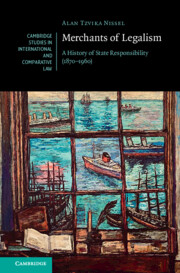Book contents
- Merchants of Legalism
- Cambridge Studies in International and Comparative Law: 190
- Merchants of Legalism
- Copyright page
- Dedication
- Epigraph
- Contents
- Acknowledgments
- Prologue
- 1 The Responsibilities of States in International Law
- 2 The US Turn to the Technique of International Arbitration
- 3 The Creation of State Responsibility in the New World
- 4 International Responsibility as German Philosophy
- 5 State Responsibility as World Order
- Epilogue
- Bibliography
- Index
- Cambridge Studies in International and Comparative Law
2 - The US Turn to the Technique of International Arbitration
Published online by Cambridge University Press: 19 December 2024
- Merchants of Legalism
- Cambridge Studies in International and Comparative Law: 190
- Merchants of Legalism
- Copyright page
- Dedication
- Epigraph
- Contents
- Acknowledgments
- Prologue
- 1 The Responsibilities of States in International Law
- 2 The US Turn to the Technique of International Arbitration
- 3 The Creation of State Responsibility in the New World
- 4 International Responsibility as German Philosophy
- 5 State Responsibility as World Order
- Epilogue
- Bibliography
- Index
- Cambridge Studies in International and Comparative Law
Summary
I trace the origins of modern international arbitration to the late nineteenth-century Americas. I identify the appointment of Francis Lieber to the US–Mexican Commission of 1868 as the modern prototype of international arbitration. The US employed arbitration with Latin American countries differently than it did with Great Britain and other European states, mainly because of the US foreign policy known as the Monroe Doctrine. The US turn to international arbitration was a project that sought to protect US – not European or Latin American – interests. At the center of this practice was Secretary of State Hamilton Fish. Fish professionalized the State Department and, in the process, bolstered its resolution of diplomatic claims. From 1868 to 1898, US diplomats established international arbitration as the default tool of protecting its nationals who were injured within Latin America. The resulting international awards began to articulate rules regarding a state’s responsibility for injuries to aliens.
Keywords
- Type
- Chapter
- Information
- Merchants of LegalismA History of State Responsibility (1870–1960), pp. 34 - 118Publisher: Cambridge University PressPrint publication year: 2024

